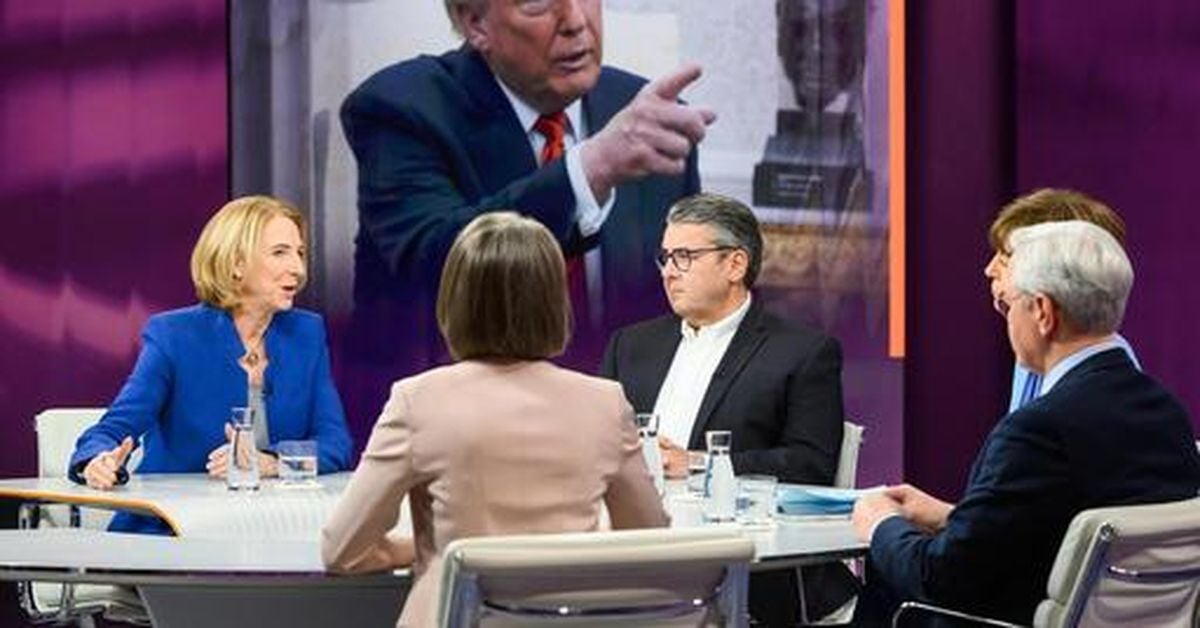In a recent episode of Maybrit Illner aired on March 20, 2025, prominent figures from German politics and international relations gathered to discuss the geopolitical implications of recent communications between former U.S. President Donald Trump and Russian President Vladimir Putin. The discussion centered around the apparent failed attempts at a ceasefire between Russia and Ukraine, as well as the broader implications of U.S.-Russia relations on European security.
The guest list for the episode included former German Foreign Minister Sigmar Gabriel, CDU politician Norbert Röttgen, security expert Claudia Major from the German Marshall Fund, and former Trump advisor John Bolton, alongside ZDF correspondent Katrin Eigendorf. This gathering took place against the backdrop of a two-hour phone conversation between Trump and Putin on Tuesday, which was meant to initiate a 30-day ceasefire between the two conflicting nations. However, according to German Defense Minister Boris Pistorius, this call ended up being a ‘null number’ because the anticipated peace results did not materialize and Russian military attacks continued unabated.
Bolton commented on the nature of Trump’s dealings with Putin, stating that Trump prioritizes maintaining a ‘good relationship with his good friend’ and that while Putin appears to be playing Trump, he does not wish to embarrass him. This approach is seen as a tactic to not jeopardize any concessions Trump may grant him regarding Ukraine. Bolton warns of a ‘serious danger’ that Trump, along with his new political allies, could formally withdraw from NATO or undermine the institution altogether if America’s European partners do not ramp up their defense spending.
In response to questions about Trump’s motivations and actions, Röttgen asserted, ‘We don’t question anything, but we have to prepare for everything possible.’ He insisted that despite ongoing hostilities, Germany must reinforce its defense posture and prepare to address potential threats independently. However, Gabriel countered this sentiment by emphasizing the necessity of U.S. influence, arguing that Europe is not equipped to tackle Russia on its own without American support.
Gabriel, serving as the chair of the Atlantik-Brücke, took a somewhat cynical view, suggesting that should such tensions escalate—in terms of security—Europe might be facing serious threats from Russia, particularly by the year 2030. He sardonicly noted, ‘If I were Putin, I would come in 2028,’ pinning further concerns on the potential consequences of underestimating Russia’s ambitions. His remarks encapsulated a narrative emerging in the EU that warned against placing reliance on a singular geopolitical dynamic and highlighted the pressing need for collective European involvement in ceasefire negotiations.
Claudia Major intensified this discourse by articulating the gravity of the current threat environment. Repercussions of Russia’s aggression are compounded by the U.S. factors turning away. Major indicated that if Ukraine were to be weakened further, it would likely be an easy target for Russian aggression within three years. She underscored the urgency of fostering a stronger Ukraine, as Europe stands to benefit significantly from a stable and sovereign neighbor.
As the dialogue progressed, conversation turned towards Trump’s reputation in Europe and Zelensky’s rising popularity amidst international conferences. Katrin Eigendorf highlighted that Trump’s aversion to Zelensky stems from his desire to be the focal point within the geopolitical sphere—a role currently filled by the Ukrainian president. Maior even speculated that the U.S. might transition from a democratic ally for Europe to a potential security threat as Trump’s policies evolve.
The panel acknowledged that Europe’s geopolitical landscape stands precariously at the intersection of Russian ambitions and the evolving, often unpredictable American policy. John Bolton reaffirmed that the mutual isolationist tendencies the both leaders—Trump and Putin—exhibit do not discourage manipulation; rather, they amplify the already precarious balance of power that exists.
While Sigmar Gabriel underscored the historical context of such relations, he highlighted an increase in the need for proactive diplomacy and unified actions amongst European states. Each guest recognized the potential for the Ukraine conflict to redefine transatlantic relations and emphasized the necessity for a coalition willing to engage and address security matters with Russia, beyond existing frameworks.
In conclusion, the episode of Maybrit Illner foreshadowed complex geopolitical challenges that lie ahead, significantly influenced by the interplay between Trump and Putin’s relationship and its implications on global peace and security. The messages articulated underscored the urgent need for European leaders to step up and pursue united strategies to navigate the uncertain geopolitical waters.
